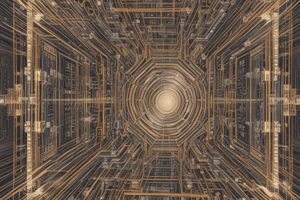Podcast
Questions and Answers
What is the primary function of the Central Processing Unit (CPU)?
What is the primary function of the Central Processing Unit (CPU)?
- Managing the instruction-execution cycle (correct)
- Acting as a secondary storage device
- Facilitating communication between hardware devices
- Storing permanent data
Which type of memory is characterized by being readable, writable, and usually volatile?
Which type of memory is characterized by being readable, writable, and usually volatile?
- EPROM
- ROM
- RAM (correct)
- Flash Memory
What operation does the Program Counter (PC) perform in the CPU?
What operation does the Program Counter (PC) perform in the CPU?
- Stores the result of arithmetic operations
- Holds the address of the next instruction to be executed (correct)
- Transmits data to external devices
- Loads data into memory
Which of the following best describes Read Only Memory (ROM)?
Which of the following best describes Read Only Memory (ROM)?
Which of the following is NOT a part of the instruction-execution cycle?
Which of the following is NOT a part of the instruction-execution cycle?
Which operation is categorized under Data Movement Operations?
Which operation is categorized under Data Movement Operations?
What does the System Clock do in a computer system?
What does the System Clock do in a computer system?
Which modern processor is known for achieving maximum turbo frequency speeds of up to 6.2 GHz?
Which modern processor is known for achieving maximum turbo frequency speeds of up to 6.2 GHz?
How many total cores does the i9-14900KS processor have?
How many total cores does the i9-14900KS processor have?
What is the base clock speed of the AMD Ryzen 9 9950X?
What is the base clock speed of the AMD Ryzen 9 9950X?
Which memory type does the i9-14900KS support?
Which memory type does the i9-14900KS support?
What is the maximum boost clock speed of the AMD Ryzen 9 9950X?
What is the maximum boost clock speed of the AMD Ryzen 9 9950X?
What is the total number of PCIe lanes supported by the i9-14900KS?
What is the total number of PCIe lanes supported by the i9-14900KS?
Which architecture is the AMD Ryzen 9 9950X based on?
Which architecture is the AMD Ryzen 9 9950X based on?
What is the wattage of the base power for the i9-14900KS processor?
What is the wattage of the base power for the i9-14900KS processor?
Which type of support has been expanded for the i9-14900KS processor?
Which type of support has been expanded for the i9-14900KS processor?
Flashcards are hidden until you start studying
Study Notes
The Stored Program Concept
- Modern computers are based on the stored program concept.
- Instructions are stored in memory alongside data.
Main Memory Organization
- Memory is divided into units, called words.
- Each word has a fixed length, often defined by the processor architecture.
- Each memory word has a unique address, which allows for random access.
Main Memory Types
- Random Access Memory (RAM) is typically used for general storage.
- Allows for reading and writing of data.
- Generally volatile, meaning the stored data is lost when power is turned off.
- An example is Dynamic RAM (DRAM).
- Read Only Memory (ROM) stores data permanently, even when power is off.
- Can only be read from, not written to.
- Used for special-purpose storage, such as storing boot instructions.
CPU Architecture
- CPU (Central Processing Unit) controls the instruction execution cycle, coordinating the activities of the computer's other components.
- PC (Program Counter) holds the address of the next instruction to be executed.
- MAR (Memory Address Register) holds the address of the memory location to be accessed.
- MDR (Memory Data Register) holds the data that is being transferred to or from memory.
- IR (Instruction Register) holds the current instruction being executed.
- ALU (Arithmetic Logic Unit) performs arithmetic and logical operations on data.
- ACC (Accumulator) holds the result of operations.
Instruction Cycle
- FETCH instruction from memory.
- DECODE the instruction to determine the operation to be performed.
- EXECUTE the instruction.
Types of Processor Operations
- Data Movement Operations: Moving data between memory and the CPU, or within memory itself. Includes input and output operations.
- Arithmetic and Logical Operations: Performing mathematical operations and comparing values.
- Program Control Operations:
- Start and halt programs.
- Skip to other instructions.
- Test data to decide whether to skip certain instructions.
Scale and Performance Factors
- Modern CPUs are fabricated using Very Large Scale Integration (VLSI).
- This allows for complex designs and a higher density of transistors on a single chip.
- Intel® Core i9 processor-14900KS offers up to 6.2 GHz max turbo frequency, 24 cores, 32 threads, 150 watt processor base power, 36MB Intel Smart Cache, and 20 PCIe lanes.
- AMD Ryzen 9 9950X offers a base clock speed of 4.3 GHz, a max boost clock speed of 5.7 GHz, support for PCIe Gen 5 technology, and 5600 MHz ECC DDR5 RAM.
Intel and AMD
- Intel is a leading semiconductor manufacturer, known for its integrated electronics.
- AMD (Advanced Micro Devices, Inc.) is a global company that specializes in manufacturing semiconductor devices used in computer processing.
- Both Intel and AMD are major suppliers of microprocessors.
Overclocking
- Overclocking involves increasing the clock speed of a CPU beyond its default settings.
- This can improve performance, but can also generate more heat and potentially reduce the lifespan of the CPU.
Studying That Suits You
Use AI to generate personalized quizzes and flashcards to suit your learning preferences.




